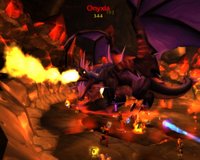On a scale from zero to five
 Let's rate a modern software platform, such as Java
or .Net, on how it solves the five paradoxes of the Web. Java and .Net are similar enough so it doesn't make sense to compare them against each other.
For a benchmark, consider a modern gaming platform: a MMORPG such as
EverQuest or World of Warcraft.
Let's rate a modern software platform, such as Java
or .Net, on how it solves the five paradoxes of the Web. Java and .Net are similar enough so it doesn't make sense to compare them against each other.
For a benchmark, consider a modern gaming platform: a MMORPG such as
EverQuest or World of Warcraft.
The modern software platform doesn't address at all the Compensation paradox, Identity paradox or Responsibility paradox: so the maximum score it can get is two. On the Compatibility paradox, it scores around 0.7: I will argue later that a perfect score requires an open source primary implementation. On the Boundary paradox, the score is at most 0.7 as well: the boundaries between VMs are still apparent, as boundary-aware abstraction such as threads and sockets are part of the core API.
MMORPGs addresses more of the Web's problems. 0.7 on the Compensation paradox: a viable economy is present, but there is just one bank. 0.2 on the Identity paradox: at least it knows your nickname. 0.7 on the Compatibility paradox: single closed-source implementation. Zero on the Boundary paradox. And 0.5 on the Responsibility paradox, since there is a central but active authority.
Final rating is: modern software platform—1.4, modern gaming platform—2.1. To build a successor to the Web, don't start with .Net: instead, take World of Warcraft and make it suitable for general purpose use.
 Subscribe.
Subscribe.
3 Comments:
Clay Shirky might agree: Playfulness in 3D Spaces: Why Quake is better than VRML
While I applaud investigating such a radical solution to the problems of the web, I'm inclined to disagree with you here.
Most of the advantages that World of Warcraft has over the web is its closed-platform nature: Blizzard runs all the servers, all the client apps, and charges you to use the service.
This could never scale to an entity as large as the web, nor could it.
Sam:
Why can't a single open source implementation scale? Client and server can be developed in a model where there is an official "reference" implementation. Throw in autoupgrade capabilities to keep all the code up-to-date. This will be not much different from WoW, only with much larger number of program instances.
World of Warcraft has 4 million players. (source) That's not much different from the scale of the Web.
Post a Comment
<< Home